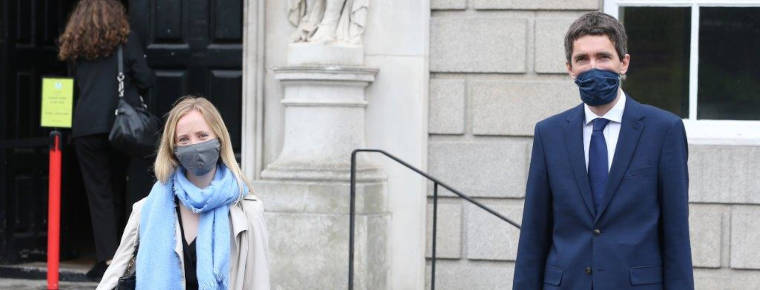 FIE's Clodagh Daly and solicitor Andrew Jackson
Pic: RollingNews.ie
FIE's Clodagh Daly and solicitor Andrew Jackson
Pic: RollingNews.ie
Supreme Court quashes 2017 climate action plan
The Supreme Court has quashed the National Mitigation Plan published by the Government in 2017, which was aimed at tackling climate change.
The court ruled that the plan was not specific enough to comply with the Climate Action and Low Carbon Development Act 2015.
Rights
The case was brought by Friends of the Irish Environment (FIE), which was given leave earlier this year to appeal a High Court ruling in September last year which dismissed its legal challenge to the plan.
The group had argued that pursuing the plan involved actions that breached fundamental rights under the Irish Constitution and the European Convention of Human Rights (ECHR).
Emissions
The case centred on whether the Government was entitled to adopt a plan that will lead to increased greenhouse gas emissions in a situation where it has been warned that this would lead to serious environmental impacts and fundamental rights breaches.
In a judgment delivered by Chief Justice Frank Clarke, the court accepted FIE’s argument that the plan did not comply with its legislative remit and was therefore ultra vires, adding that the issues raised did not amount to an impingement by the court into areas of Government policy.
“What might once have been policy has become law by virtue of the enactment of the 2015 Act,” the court said.
Transparency
The plan was adopted under the 2015 legislation and its purpose is to enable the state to “pursue and achieve the objective of transitioning to a low carbon climate resilient and environmentally sustainable economy by the end of 2050”.
The 2050 target is known as the National Transitional Objective (NTO), and the court ruled that that the legislation required transparency in how the plan would achieve this.
The judgment said that the 2015 Act demanded a level of detail “so that a reasonable and interested person could make a judgment both as to whether the plan in question is realistic and as to whether they agree with the policy options for achieving the NTO which such a plan specifies”.
Standing
The Supreme Court added, however, that FIE, as a corporate entity which does not enjoy in itself the right to life or the right to bodily integrity, did not have standing to maintain the rights-based arguments it put forward under the Constitution or under the ECHR.
The chief justice said it was important to address this issue as it could arise in a future challenge to any new plan.
The court also said that the right to a healthy environment cannot be derived from the Constitution, though the chief justice did not rule out constitutional rights and obligations being “engaged in the environmental field in an appropriate case”.
Gazette Desk
Gazette.ie is the daily legal news site of the Law Society of Ireland